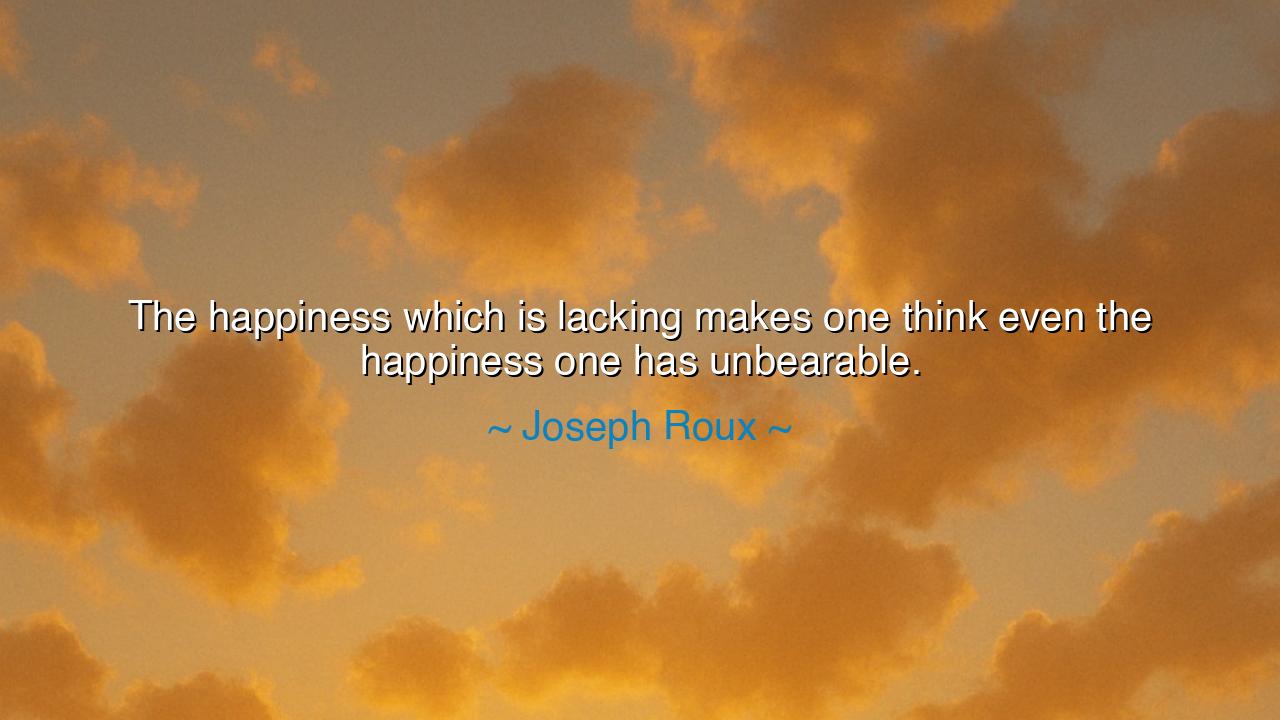
The happiness which is lacking makes one think even the happiness






Hear now the quiet wisdom of Joseph Roux, the French priest and poet of the 19th century, who gazed deeply into the heart of human longing and said: “The happiness which is lacking makes one think even the happiness one has unbearable.” These words are not the complaint of a pessimist, but the revelation of a soul who understood the restless nature of mankind. For the human heart, insatiable and dreaming, often turns away from what it already possesses, fixing its gaze instead on what it lacks. And in doing so, it poisons its own joy.
Roux spoke in a time when Europe, weary from revolutions and disillusionment, searched for meaning in faith, art, and thought. Yet his insight transcends his century—it belongs to every age. He saw that happiness, that tender and elusive creature, is often destroyed not by sorrow, but by comparison. The mind, hungering always for “more,” transforms abundance into scarcity. When we measure what we have against what we wish we had, our gratitude dies, and the sweetness of our blessings turns to bitterness. Thus, the happiness which is lacking casts a shadow even upon the happiness which is present.
In this, Roux revealed a deep truth about the human condition: that discontent does not come from deprivation alone, but from desire ungoverned by wisdom. Consider a man who sits in a garden surrounded by roses, yet his eyes are fixed on the one unopened bud. Though beauty surrounds him, he cannot rest, for his heart burns for the one thing he does not yet possess. Such is the nature of longing when it loses balance—it blinds us to what is already ours. In the endless chase for what is missing, we forget to cherish what is found.
History is filled with such examples. Think of Alexander the Great, who conquered nations from Greece to India. When he wept, it was not for the vastness of his victories, but because, as legend tells, there were no more worlds left to conquer. His happiness, once mighty, became unbearable because of the void that followed fulfillment. He had gained everything, yet felt impoverished. In his heart burned that same fire Roux described—the torment of a man who measures his joy not by what he holds, but by what remains beyond his grasp.
And yet, the opposite is also true: those who learn to cherish what is present find peace even in the midst of limitation. Epictetus, the slave turned philosopher, taught that happiness belongs to the one who aligns his desires with reality. “Do not wish that things happen as you wish,” he said, “but wish that they happen as they do happen, and you will be content.” His chains could not imprison his spirit, for he understood that the true battlefield of contentment lies not in the world, but within the soul. He lacked much, yet was never miserable, for he did not let the happiness that was lacking devour the happiness he already possessed.
Thus, the lesson of Joseph Roux is both simple and profound: learn to see what is before you, and guard your heart against the mirage of “if only.” If only I were richer, more loved, more accomplished—these are the whispers that steal peace from the heart. The wise do not let such voices rule them. They anchor their minds in gratitude, finding joy in the small, the ordinary, the real. When the soul learns to say, “This is enough,” it discovers that it was never poor.
So, my child, remember this: the absence of a single star should not make you blind to the beauty of the night sky. The fruit not yet ripened should not make you forget the sweetness of those already ripe. When envy or longing rise within you, breathe deeply and count your blessings. Look around you—there is joy enough here, if only you choose to see it. For in truth, happiness is not something to be found in the distance; it is something to be recognized in the light of what already is.
Thus spoke Roux through the ages—a voice reminding humankind that fulfillment is not the result of having all, but of loving well what we already have. Do not let the phantom of what is missing turn the music of life into silence. Celebrate what is, cherish what remains, and you will find that your happiness, far from unbearable, becomes deep, steady, and eternal.






AAdministratorAdministrator
Welcome, honored guests. Please leave a comment, we will respond soon